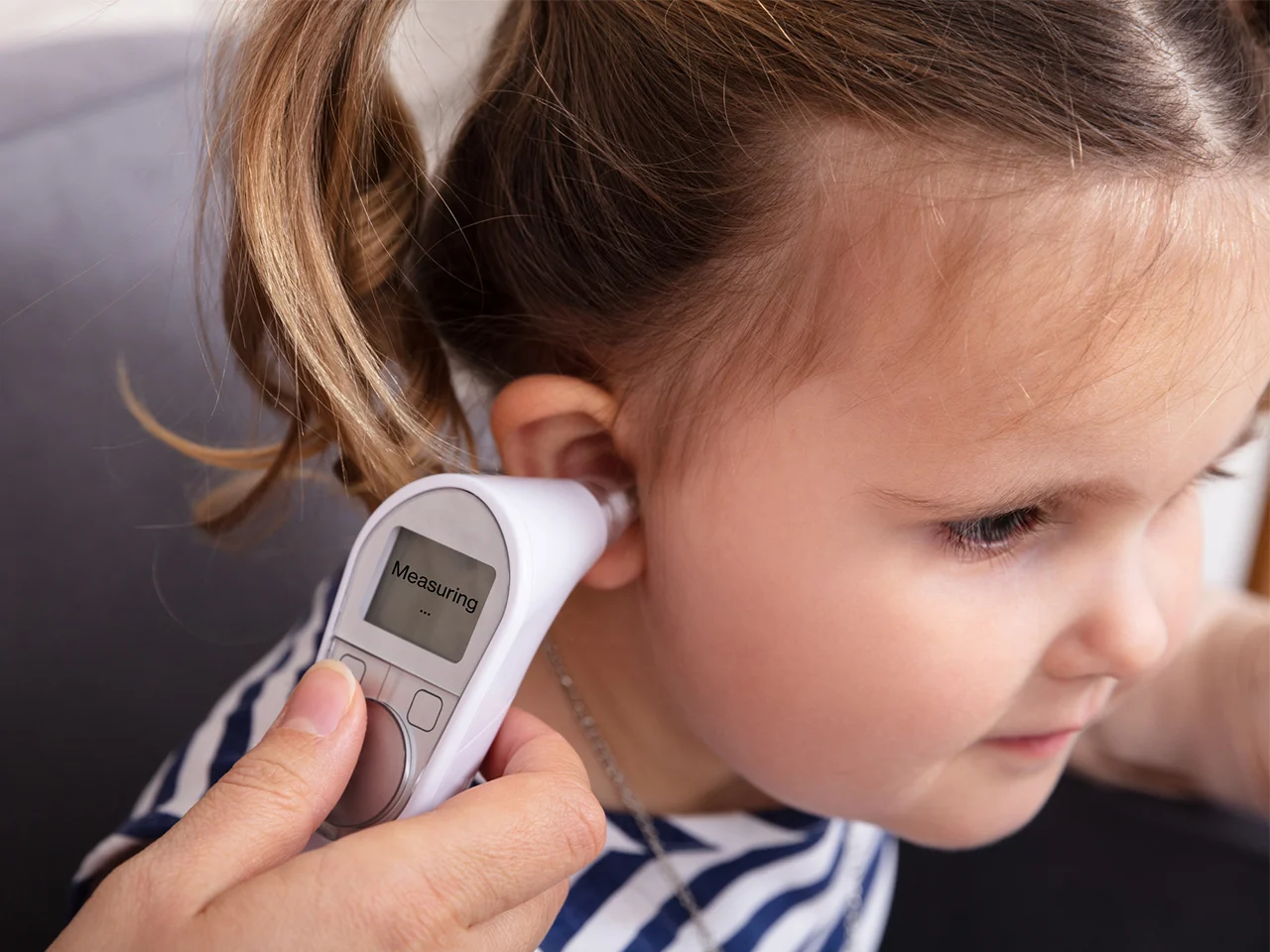Home>Health & Nutrition>The Impact Of Temperature Changes On Health: Can Going From Hot To Cold Make You Ill?


Health & Nutrition
The Impact Of Temperature Changes On Health: Can Going From Hot To Cold Make You Ill?
Published: February 19, 2024
Discover the effects of temperature changes on health and whether transitioning from hot to cold can impact your well-being. Learn more about health and nutrition.
(Many of the links in this article redirect to a specific reviewed product. Your purchase of these products through affiliate links helps to generate commission for Temperatures.com, at no extra cost. Learn more)
Table of Contents
Understanding the Relationship Between Temperature Changes and Health
Temperature changes have a profound impact on human health, influencing various physiological and psychological processes. The body's ability to adapt to fluctuating temperatures is a testament to its remarkable resilience, but extreme or abrupt changes can pose significant challenges. Understanding the intricate relationship between temperature variations and health is crucial for maintaining overall well-being.
The human body operates within a narrow temperature range, and any deviation from this equilibrium can trigger a cascade of responses. When exposed to high temperatures, the body employs mechanisms such as sweating and vasodilation to dissipate heat and maintain a stable internal environment. Conversely, in cold conditions, vasoconstriction and shivering help conserve heat and prevent hypothermia.
Moreover, temperature fluctuations can impact immune function, making individuals more susceptible to certain illnesses. For instance, cold weather is often associated with an increased risk of respiratory infections, while hot and humid conditions can exacerbate allergic reactions and heat-related illnesses. Additionally, sudden shifts in temperature may disrupt sleep patterns, affect mood, and contribute to feelings of fatigue or lethargy.
Furthermore, the relationship between temperature changes and health extends beyond immediate physiological effects. Prolonged exposure to extreme heat or cold can exacerbate chronic conditions such as cardiovascular diseases, respiratory disorders, and musculoskeletal pain. Additionally, vulnerable populations, including the elderly, children, and individuals with pre-existing health concerns, are particularly susceptible to the adverse effects of temperature fluctuations.
Understanding the interplay between temperature variations and health is essential for implementing preventive measures and mitigating potential risks. By recognizing the impact of temperature changes on the body's regulatory mechanisms and overall well-being, individuals can make informed decisions to safeguard their health during fluctuating weather conditions.
In the subsequent sections, we will delve deeper into the specific effects of hot and cold weather on the body, explore the broader implications of temperature changes on overall health, and provide practical tips for managing health during temperature fluctuations.
The Effects of Hot Weather on the Body
Hot weather exerts a profound impact on the human body, eliciting a range of physiological responses and potential health implications. When exposed to high temperatures, the body initiates a series of adaptive mechanisms to regulate its internal environment and cope with the heat stress.
Dehydration and Electrolyte Imbalance
Prolonged exposure to hot weather can lead to excessive sweating, resulting in fluid loss and potential dehydration. Dehydration not only impairs physical performance but also disrupts essential bodily functions, affecting cognitive abilities and increasing the risk of heat-related illnesses. Furthermore, sweating leads to the loss of electrolytes, such as sodium and potassium, which are crucial for maintaining proper muscle and nerve function. Electrolyte imbalances can manifest as muscle cramps, weakness, and in severe cases, may lead to heat exhaustion or heatstroke.
Heat Exhaustion and Heatstroke
Hot weather can precipitate heat-related illnesses, including heat exhaustion and heatstroke. Heat exhaustion is characterized by symptoms such as profuse sweating, weakness, nausea, and dizziness, often accompanied by a rapid pulse and low blood pressure. If left unaddressed, heat exhaustion can progress to heatstroke, a life-threatening condition marked by a body temperature exceeding 104°F (40°C), altered mental state, and potential organ damage. Heatstroke requires immediate medical attention and can be fatal if not promptly treated.
Cardiovascular Strain
High temperatures place additional strain on the cardiovascular system, particularly in individuals with pre-existing heart conditions. The body's efforts to dissipate heat through vasodilation and increased cardiac output can elevate heart rate and blood pressure, potentially exacerbating underlying cardiovascular issues. Moreover, hot weather can contribute to the formation of ground-level ozone, a pollutant that can exacerbate respiratory conditions and cardiovascular diseases, further compromising cardiovascular health.
Impact on Respiratory Function
Hot and humid conditions can adversely affect respiratory function, particularly in individuals with asthma or other respiratory disorders. Elevated temperatures and air pollution can exacerbate airway inflammation and bronchoconstriction, triggering asthma attacks and respiratory distress. Additionally, high humidity levels can impede the body's ability to dissipate heat through sweating, leading to a heightened risk of heat-related respiratory complications.
Skin Health
Excessive sun exposure and high temperatures can impact skin health, increasing the risk of sunburn, heat rash, and other dermatological issues. Prolonged exposure to UV radiation can cause skin damage, premature aging, and elevate the risk of skin cancer. Furthermore, high temperatures and humidity can exacerbate certain skin conditions, such as eczema and fungal infections, necessitating diligent skin care and sun protection measures.
In summary, hot weather can exert a multifaceted impact on the body, encompassing dehydration, heat-related illnesses, cardiovascular strain, respiratory challenges, and skin health concerns. Understanding these effects is crucial for implementing preventive measures and safeguarding overall well-being during periods of elevated temperatures.
The Effects of Cold Weather on the Body
Cold weather elicits a distinct set of physiological responses and potential health implications, profoundly impacting the human body's functionality and overall well-being. When exposed to low temperatures, the body initiates adaptive mechanisms to conserve heat and maintain internal stability.
Hypothermia and Frostbite
One of the most significant risks associated with cold weather is hypothermia, a potentially life-threatening condition characterized by a drop in core body temperature below 95°F (35°C). Prolonged exposure to cold environments, especially when accompanied by wet clothing or inadequate insulation, can lead to hypothermia. Initial symptoms include intense shivering, confusion, and drowsiness, which can progress to loss of coordination, slurred speech, and ultimately, unconsciousness. Prompt medical intervention is essential to prevent severe complications and fatalities associated with hypothermia.
Frostbite is another concern in cold weather, occurring when skin and underlying tissues freeze due to prolonged exposure to low temperatures. Extremities such as fingers, toes, nose, and ears are particularly vulnerable to frostbite. The affected areas may become numb, pale, and firm to the touch, accompanied by a stinging or burning sensation. Severe frostbite can result in tissue damage, requiring medical treatment to prevent long-term consequences such as gangrene and amputation.
Read more: The Impact Of Sunspots On Earth’s Climate
Respiratory Challenges
Cold weather can pose challenges to respiratory function, particularly in individuals with pre-existing respiratory conditions. Inhalation of cold air can trigger airway constriction and bronchospasm, exacerbating symptoms in individuals with asthma, chronic obstructive pulmonary disease (COPD), or bronchitis. Additionally, cold temperatures and low humidity levels can contribute to dry, irritated airways, potentially increasing the susceptibility to respiratory infections.
Cardiovascular Effects
The cardiovascular system also faces additional demands in cold weather as the body works to maintain core temperature. Vasoconstriction, the narrowing of blood vessels in response to cold, can elevate blood pressure and strain the heart. Individuals with cardiovascular conditions, such as hypertension or coronary artery disease, may experience exacerbated symptoms in cold environments, emphasizing the need for careful monitoring and management during temperature fluctuations.
Musculoskeletal Impact
Cold weather can exacerbate musculoskeletal pain and stiffness, particularly in individuals with arthritis or other joint-related conditions. The drop in temperature and changes in barometric pressure can contribute to increased discomfort and reduced mobility. Moreover, the risk of slips and falls is heightened in icy conditions, posing a potential threat to musculoskeletal health.
Skin Concerns
The skin is exposed to unique challenges in cold weather, including dryness, chapping, and heightened susceptibility to frostbite. Protective measures such as moisturizing, wearing appropriate clothing layers, and minimizing skin exposure are essential for preserving skin health in cold environments.
In summary, cold weather exerts a multifaceted impact on the body, encompassing the risks of hypothermia, frostbite, respiratory challenges, cardiovascular strain, musculoskeletal discomfort, and skin concerns. Understanding these effects is crucial for implementing preventive measures and safeguarding overall well-being during periods of low temperatures.
How Temperature Changes Can Impact Overall Health
Temperature changes exert a profound influence on overall health, encompassing a spectrum of physiological, psychological, and environmental factors. The body's intricate regulatory mechanisms continuously strive to maintain internal stability amidst fluctuating temperatures, and the impact of these changes extends beyond immediate physical manifestations.
Prolonged exposure to extreme heat can lead to dehydration, electrolyte imbalances, and heat-related illnesses, posing significant health risks. Dehydration, resulting from excessive sweating and inadequate fluid intake, can impair cognitive function, physical performance, and vital organ function. Furthermore, electrolyte imbalances, particularly the loss of sodium and potassium, can manifest as muscle cramps, weakness, and in severe cases, may lead to heat exhaustion or heatstroke. These conditions necessitate prompt intervention to prevent life-threatening consequences.
Conversely, cold weather presents its own set of challenges, including the risk of hypothermia, frostbite, and exacerbated respiratory and cardiovascular conditions. Hypothermia, characterized by a drop in core body temperature, can lead to confusion, loss of coordination, and ultimately, unconsciousness if left untreated. Frostbite, resulting from prolonged exposure to cold, can cause tissue damage and necessitate medical attention to prevent long-term complications. Additionally, cold temperatures can trigger airway constriction and exacerbate cardiovascular strain, particularly in individuals with pre-existing health concerns.
Moreover, temperature changes can impact immune function, making individuals more susceptible to respiratory infections, allergic reactions, and other illnesses. Cold weather is often associated with an increased risk of respiratory infections, while hot and humid conditions can exacerbate allergic reactions and heat-related illnesses. Furthermore, abrupt shifts in temperature can disrupt sleep patterns, affect mood, and contribute to feelings of fatigue or lethargy, influencing overall well-being.
Beyond immediate physiological effects, temperature changes can exacerbate chronic health conditions, including cardiovascular diseases, respiratory disorders, and musculoskeletal pain. Vulnerable populations, such as the elderly, children, and individuals with pre-existing health concerns, are particularly susceptible to the adverse effects of temperature fluctuations, necessitating tailored preventive measures and heightened vigilance.
Understanding the broader implications of temperature changes on overall health is essential for implementing proactive strategies to mitigate potential risks. By recognizing the multifaceted impact of temperature variations on the body's regulatory mechanisms, immune function, and susceptibility to illnesses, individuals can make informed decisions to safeguard their health during fluctuating weather conditions. This awareness underscores the importance of adopting adaptive measures, seeking appropriate medical guidance, and prioritizing self-care to navigate the dynamic interplay between temperature changes and overall health.
In summary, the intricate relationship between temperature changes and overall health underscores the need for proactive measures to mitigate potential risks and safeguard well-being amidst fluctuating environmental conditions.
Tips for Managing Health During Temperature Changes
-
Stay Hydrated: Maintaining adequate hydration is crucial during temperature changes, especially in hot weather. Consume plenty of water and electrolyte-rich fluids to offset the effects of sweating and prevent dehydration.
-
Dress Appropriately: In cold weather, layer clothing to retain body heat and protect against hypothermia. In hot weather, opt for lightweight, breathable fabrics to facilitate sweat evaporation and cooling.
-
Protect Your Skin: Use sunscreen and wear protective clothing to shield your skin from harmful UV rays in hot weather. In cold weather, moisturize to prevent dryness and chapping, and cover exposed skin to minimize frostbite risk.
-
Monitor Vulnerable Populations: Keep a close eye on the elderly, children, and individuals with pre-existing health conditions during temperature changes. They are more susceptible to temperature-related health issues and may require additional support.
-
Adapt Physical Activity: Adjust the intensity and duration of outdoor activities based on the prevailing temperature. Exercise during cooler parts of the day in hot weather and ensure adequate warm-up in cold conditions to prevent muscle strain.
-
Create a Comfortable Indoor Environment: Use fans, air conditioning, or heating systems to maintain a comfortable indoor temperature. This is especially important for vulnerable individuals and those with respiratory conditions.
-
Seek Medical Advice: If you have underlying health concerns, consult a healthcare professional for personalized guidance on managing your health during temperature changes. They can provide tailored recommendations to mitigate potential risks.
-
Be Mindful of Air Quality: Pay attention to air quality alerts, especially in hot weather when ground-level ozone levels may be elevated. Limit outdoor exposure during poor air quality conditions to protect respiratory health.
-
Plan for Travel: If traveling to regions with extreme temperatures, prepare accordingly. Pack appropriate clothing, stay informed about local weather conditions, and acclimatize gradually to temperature variations.
-
Stay Informed: Keep abreast of weather forecasts and be aware of upcoming temperature changes. This allows you to plan and adapt your activities to minimize health risks associated with fluctuating temperatures.
By implementing these tips, individuals can effectively manage their health during temperature changes, reducing the likelihood of temperature-related health issues and promoting overall well-being.












